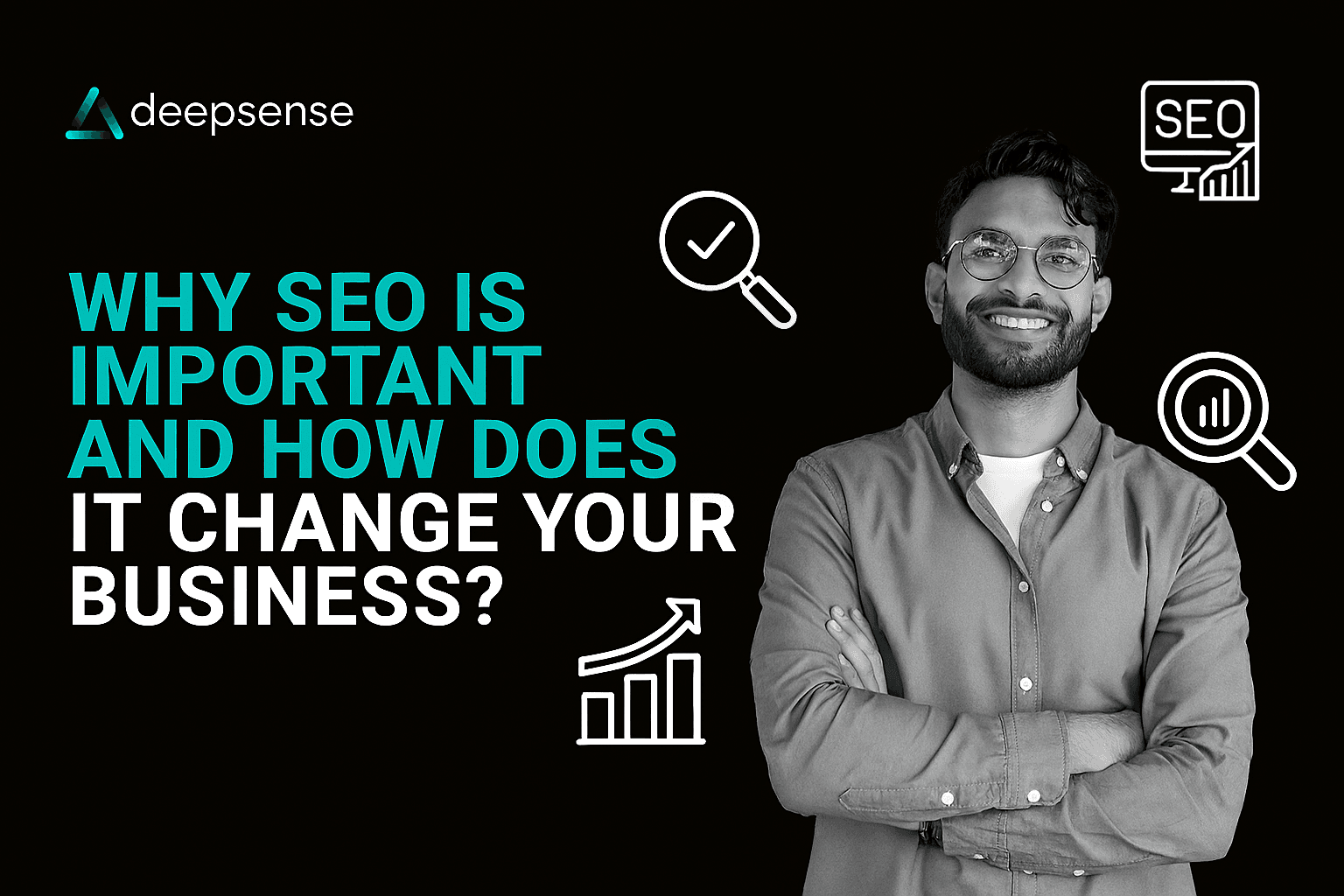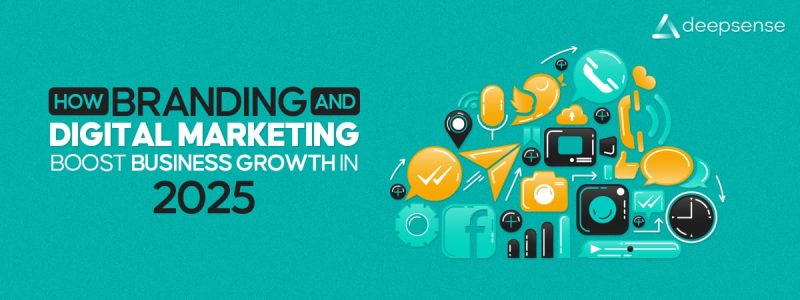Why SEO is important and how does it change your business?
In a digital world, visibility isn’t just power, it’s profit.
Introduction: The Digital Storefront
Imagine investing lakhs in designing a beautiful showroom or office, hiring a brilliant team, perfecting your products or services… and then putting your store in a remote alley with no signage or directions.
That’s exactly what happens when you have a great website or brand, but no SEO.
In today’s world, customers don’t walk in through the door. They search, scroll, compare, and click. That’s where Search Engine Optimization (SEO) becomes your most powerful tool, not just for traffic, but for building brand authority, winning trust, and converting interest into income.
So, let’s dive into a comprehensive breakdown of why SEO is essential and how it can revolutionize your business, no matter what industry you’re in.
What Is SEO? A Quick Overview
SEO stands for Search Engine Optimization, a set of techniques designed to improve your website’s visibility on search engines like Google, Bing, and Yahoo.
Whenever someone searches for something like:
“Best wedding photographer in Chennai”
“Affordable graphic design tools”
“How to apply for a Canada visa”
…Google scans billions of web pages to serve the most relevant, helpful, and trusted answers.
SEO is how you prove to Google that your website deserves to be at the top.
How SEO Works (The Simple Version)
When you create valuable content, optimize it for relevant search terms (called keywords), and make your website technically sound, Google sees your website as helpful, trustworthy, and deserving of attention.
SEO helps:
Search engines find your content
Understand what it’s about
Show it to people searching for it
When done right, SEO brings free, high-intent traffic that’s more likely to convert.
Why SEO Is Important: The 360° Impact on Your Business
Let’s break down the top reasons SEO isn’t just useful, it’s transformative.
1. SEO Drives Organic Traffic That’s Highly Intent-Driven
Unlike ads that push your product onto random users, SEO pulls in people who are already searching for what you offer.
Example:
If you sell Ayurvedic skincare, ranking for “best natural face cream for dry skin” means you’re attracting a user who’s already convinced and close to buying.
Stat:
Organic search drives 53.3% of all web traffic across industries. It’s the highest-performing digital channel for most businesses.
2. Builds Trust and Brand Credibility
Users trust Google’s top results.
If your website consistently ranks high for relevant queries, you’re perceived as:
More professional
More reliable
A leading brand in your niche
Example:
A college that ranks #1 for “best B.Com college in Coimbatore” is seen as prestigious, even if they’re not advertising aggressively.
3. It’s Cost-Effective and Delivers Long-Term ROI
Unlike ads that stop delivering the moment you pause spending, SEO is a long-term asset.
Great content, strong backlinks, and a technically sound website continue to bring in leads month after month, with minimal upkeep.
Compared to paid ads:
SEO is 80% cheaper in the long run
Delivers compounding results
Works 24/7 even without ad spend
4. Increases Local Visibility (Especially for Service Businesses)
For businesses that rely on local customers (salons, restaurants, coaching centers, clinics), local SEO is the game-changer.
Example:
By optimizing for terms like “best dentist in Anna Nagar” and maintaining a strong Google Business Profile, you show up in local map packs, which have 3x higher click-through rates than ads.
5. Enhances User Experience and Website Performance
Google’s ranking factors include:
Mobile-friendliness
Site speed
Clear navigation
Easy-to-read content
Secure (HTTPS) pages
That means SEO forces you to build a better, faster, easier-to-use website, which boosts both your rankings and your conversion rates.
Result: Happier users = Lower bounce rate = Higher engagement = More sales.
6. Outrank Competitors (Even Bigger Ones)
The right SEO strategy helps you compete with bigger brands, even if you have a smaller marketing budget.
Example:
A local handmade soap brand using SEO can outrank national brands for keywords like:
“Neem soap for sensitive skin” or “best vegan soaps under ₹200”
Fact: 61% of marketers say improving SEO and growing organic presence is their top inbound marketing priority.
7. Complements Paid Ads, Social Media, and Content
SEO is not a silo. It enhances everything else:
Strong SEO landing pages boost Google Ads quality scores
Blogs created for SEO can be repurposed for emailers, social posts, and reels
SEO data helps shape content, product pages, and FAQs
Result: A unified marketing ecosystem where all channels feed each other.
8. Targets the Entire Funnel (Not Just Buyers)
SEO is not just about selling. It helps:
Educate top-of-funnel users (“What is a mutual fund?”)
Convert mid-funnel users (“Best SIP plans for beginners”)
Nurture post-purchase users (“How to manage your SIP portfolio”)
That means SEO doesn’t just get you traffic, it builds trust across every stage of the customer journey.
Real-Life SEO Wins (Mini Case Studies)
Case Study 1: EdTech Startup Grows 5x in 6 Months
Problem: New e-learning platform struggling with ad costs
SEO Strategy: Built blog content around “best courses for working professionals,” optimized their course pages, and improved technical SEO
Result:
Organic traffic grew by 500%
Reduced reliance on ads
Became a top result for over 30 course-related queries
Case Study 2: Local Dentist Dominates Search
Problem: Competing with 10+ dentists in the same area
SEO Strategy: Created location-focused landing pages, Google Business optimization, collected 100+ reviews
Result:
Ranked #1 in Google Maps
Increased appointments by 42%
Became the “go-to” dentist in the neighborhood
Case Study 3: D2C Brand Gets 7-Figure Sales from SEO
Problem: Small budget and low sales
SEO Strategy: Created buyer intent blog posts (“best skincare routine for oily skin”), optimized product descriptions, and earned backlinks through collaborations
Result:
70% of sales now come from organic traffic
SEO content ranks for over 120+ keywords
Ad spend reduced by 40%
Top Tools for SEO Success
Google Search Console – Track keyword performance
Ahrefs / SEMrush / Ubersuggest – Keyword research & audits
Google Analytics – Track traffic and conversions
Yoast SEO / Rank Math – Optimize WordPress content
Screaming Frog – Perform technical audits
PageSpeed Insights – Improve site speed
Common SEO Mistakes to Avoid
Stuffing keywords without context
Ignoring mobile optimization
Buying low-quality backlinks
Not updating old blog posts
Failing to use structured data (schema)
Conclusion: If You Want to Grow, You Can’t Ignore SEO
In today’s digital ecosystem, SEO is no longer optional, it’s essential.
It’s how small businesses can punch above their weight.
It’s how large brands maintain dominance.
It’s how startups scale smartly, and how traditional companies modernize.
SEO isn’t a hack, it’s a discipline.
It takes time. It takes effort. But the payoff is exponential.
If you’re looking for:
Sustainable growth
Quality leads
Better user experience
Higher brand authority
Long-term ROI
…then SEO is the foundation you need to build your business online.
FAQs
1. What exactly is SEO, and how does it work?
SEO (Search Engine Optimization) is the process of optimizing your website and content to appear higher in search engine results. It involves using the right keywords, creating valuable content, improving website speed, earning backlinks, and ensuring a good user experience so search engines like Google rank you higher and drive organic (unpaid) traffic to your site.
2. How long does it take to see results from SEO?
SEO is a long-term strategy. While some improvements like better speed and structure show results quickly, most SEO efforts take 3 to 6 months to reflect noticeable ranking and traffic increases. However, once the momentum builds, the results are sustainable and compounding.
3. Is SEO better than running Google Ads?
SEO and Google Ads serve different purposes. SEO builds organic visibility over time and delivers long-term ROI. Google Ads provide instant visibility but only work while you’re paying. Ideally, businesses should use both for maximum impact, Ads for short-term, SEO for long-term growth.
4. Can SEO help small businesses compete with bigger brands?
Yes! A solid SEO strategy allows smaller businesses to rank higher for niche or local keywords, attract quality leads, and build authority online, even with a smaller budget than large competitors. It levels the playing field when done right.
5. How do I know if SEO is working for my business?
You can track SEO success through tools like Google Analytics and Google Search Console. Look for improvements in:
Keyword rankings
Organic traffic
Time spent on site
Leads or conversions from organic sources
Domain authority
6. What are the key elements of an SEO strategy?
A complete SEO strategy includes:
On-page SEO (content, keywords, meta tags)
Technical SEO (site speed, mobile-friendliness, crawlability)
Off-page SEO (backlinks, reviews, social proof)
Content Marketing (blogs, landing pages, FAQs)
Local SEO (Google Business Profile, local directories)
7. Do I need a blog to rank on Google?
While not mandatory, a blog greatly boosts your SEO. It allows you to target long-tail keywords, answer common questions, provide value, and build authority. Fresh content also signals to Google that your website is active and relevant.
8. Can I do SEO myself, or should I hire an expert?
Basic SEO can be learned and implemented by business owners (especially on platforms like WordPress using plugins like Yoast). However, for technical SEO, keyword research, link building, and competitive analysis, hiring a professional ensures faster and better results.
9. Is SEO relevant for non-eCommerce businesses like clinics, schools, or B2B companies?
Absolutely. SEO is crucial for all types of businesses, whether you’re offering products or services. Local clinics, educational institutions, software companies, consultants, and more can all use SEO to drive inquiries, bookings, or conversions through organic traffic.
10. What happens if I stop doing SEO after a while?
SEO is not a “set and forget” process. If you stop, competitors who continue investing will start ranking higher over time. You may also lose rankings due to algorithm updates or outdated content. Consistency is key to maintaining and improving your visibility.











